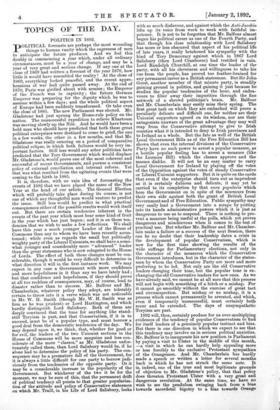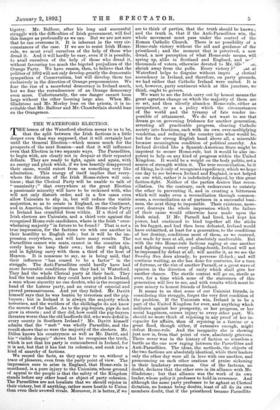TOPICS OF THE DAY. a close of 1869 had written
a forecast of the year 1870, how Party. with all 1869, everything looked peaceful, and the recent appre- hensious of war had quite passed away. At the end of of the French was in captivity ; the future German the close of 1885. The new Parliament was elected. Mr.
in a few weeks, the other in a few months, and that Mr.
portant factors. Still less would any sober politician have political eclipse, in which both failures would be very im- predicted that the Tory Government which would displace Mr. Gladstone's, would prove one of the most coherent and the Licences Bill) which the classes approve and the successful of recent Governments, and pursue a consistent masses dislike. It will not bean easy matter to carry policy of external conciliation and internal reform. Yet Local Government for Ireland by playing off the votes o that was what resulted from the agitating events that were of the Opposition against the votes of steady Conservative coming to the birth in 1885. or Liberal Unionist supporters. But it is quite on the cards It is, therefore, with no vain idea of forecasting the events of 1892 that we have placed the name of the New it is certainly dubious and delicate, it may yet be Year at the head of our article. The General Election which will probably take place during its course, is not bore the Government on in spite of the murmurs from one of which any thoughtful man would venture to predict their own side against both the grant of British Local the issue. Still less would he predict in what practical Government and of Free Education. Public sympathy may consequences either of the possible results would work itself very easily lead a Government into a scrape by putting out. But there are certain tendencies inherent in the into its hands administrative powers which it is just as events of the past year which must bear some kind of fruit in a measure being useful at the polls, which yet proves dencies that we wish to make a few reflections. We shall in the year which has just gun ; and it is on those ten- dangerous and mischievous when it comes to the test of practical use. But whether Mr. Balfour and Mr. Chamber- Commons this year a much younger Leader of the House of P Commons than any to whom we have been recently accus- lain make a failure or a success of the next Session, there tomed ; while even as regards the small but politically can be no doubt that their leadership dates a crisis in, weighty party of the Liberal Unionists, we shall have a some- the development of popular Conservatism, which is what younger and considerably more " advanced" leader now for the first time showing the results of the than the great statesman who is now relegated to the House wide suffrage for Parliamentary elections, not only in of Lords. The effect of both these changes must be con- the character of the measures which the Conservative siderable, though it would be very difficult to determine in Government introduces, but in the character of the states- what by whom the Conservative Party are more and more what direction it will in the first instance work. We may preferring to be led. Not only are the old Conservative expect in any case a Government with more confidence P and more hopefulness in it than any we have lately had ; leaders changing their tone, but the popular tone is ex- but that confidence and hopefulness, if they should prove changing the old Conservative leaders for new ones. As we have already said, we cannot be at all sure that this process at all too reckless of consequences, may, of course, lead to disaster rather than to success. Mr. Balfour and Mr. will not begin with something of a hitch or a mishap. For Chamberlain, whatever policy they adopt, are tolerably it cannot go smoothly without the exercise of great tact certain to throw into it a verve which was not noticeable and circumspection. But mishap or no mishap, it is a in Mr. W. H. Smith (though Mr. W. H. Smith was as process which cannot permanently be arrested, and which, even if temporarily unsuccessful, must certainly both firm as he was prudent) or Lord Hartington, and which hardly distinguish Lord Salisbury. Both of them are recur and be deeply convinced that the time for anything like stand- Toryism are past. still Toryism is past, and that Conservatism, if it is to 1892 will, then, certainly produce for us ever-multiplying succeed, must be of a popular type, and must borrow a evidences of the tendency of popular Conservatism to find good deal from the democratic tendencies of the day. We for itself leaders of a genuinely popular instinct and bias. may depend upon it, we think, that, whether for good or But there is one direction in which we expect to see that for evil, the leaders of the two Unionist sections in the this tendency may involve us in serious political anxieties. House of Commons will be more sanguine and less con- Mr. Balfour is to inaugurate his new position in Parliament siderate of the mere " classes," as Mr. Gladstone unfor- by paying a visit to Ulster in the middle of this month, tunately called them, than Lord Salisbury would be, if he —a visit in which he can hardly help appealing more alone had to determine the policy, of his party. The con- or less forcibly to the exclusive Protestant sympathies sequence may be a premature fall of the Government, for of the Orangemen. And Mr. Chamberlain has hardly it is always a little difficult for one party to borrow judi- made a speech or written a letter for several months ciously from the tendencies of the opposite party. Or it back in which he has not struck the same note. It may be a considerable increase in the popularity of the is, indeed, one of the true and most legitimate grounds Government. But whichever of the two it be for the of objection to Mr. Gladstone's policy, that that policy moment, we may be sure of this, that the permanent drift does threaten Protestant Ulster with a very great and of political tendency all points to that greater popularise- dangerous revolution. At the same time, we have no tion of the attitude and policy of Conservative statesmen wish to see the pendulum swinging back from a bias on which Mr. Traill, in his Life of Lord Salisbury, looks towards sacerdotal bigotry to a bias towards Orange with so much disfavour, and against which the Anti-Jacobin lifts up its voice from week to week with faithful potence. It is not to be forgotten that Mr. Balfour almost POLITICS IN 1892, began his political career as one of the Fourth Party, and POLITICAL forecasts are perhaps the most wounding that though his close relationship with Lord Salisbury things to human vanity which the eagerness of men has more or less obscured that aspect of his political life to anticipate the future produces. And we feel this of late years, it really betokened his sympathy with the doubly in commencing a year which, under all ordinary kind of Tory Democracy against which in 1867 Lord circumstances, must be a year of change, and may be Salisbury (then Lord Cranborne) had testified in vain. year of very great and serious change. If any one at the Lord Randolph Churchill, at one time the leader of the his cleverness and willingness to take his little it would have resembled the reality ! At the close of cue from the people, has proved too feather-brained for any permanent career as a British statesman. But Sir John Gorst, another member of that minute party, is steadily 1870, Paris was girdled about with armies ; the Emperor gaining ground in politics, and gaining it just because he studies the popular tendencies of the hour, and endea- Emperor was preparing for the dignity which he was to yours to filter away their impurities through the fine assume within a few days ; and the whole political aspect network of a shrewd politician's brain. Mr. Balfour and Mr. Chamberlain may easily miss their spring. The of Europe had been suddenly transformed. Or take even first great task on which they are embarked will prove a. Gladstone had just sprung the Home-rule policy on the peculiarly delicate and difficult one, for neither are their U nation. The unsuccessful expedition to relieve Khartoum Unionist supporters agreed on its wisdom, nor are their well was moving slowly up the Nile. And he would have been a antagonists unaware of the great advantage they may we bold man who should have predicted that both these great reap from the Conservative attempt to give to Irish counties what it is intended to deny to Irish provinces and political enterprises were destined to come to grief, the one to Ireland as a whole. But the fate as well of the British L Gladstone was really entering on a period of comparative Local Government Bills as of the Free Education Bill has shown that even the internal divisions of the Conservative Party have no such power to arrest a popular measure, as a hostile popular feeling has to arrest a measure (like coming to the birth in 1885. or Liberal Unionist supporters. But it is quite on the cards that even if the enterprise should turn out as imprudent as carried to its completion by that aura popularis which begun; dangerous to use as to suspend. There is nothing to pre- G l extended. The days of unsympathetic bigotry. Mr. Balfour, after his long and successful struggle with the difficulties of Irish government, will feel this danger as profoundly as we can. But we are not sure that he can overcome it. It is inherent in the very cir- cumstances of the case. If we are to resist Irish Home- rule, we must avail ourselves of the help of those who dread it. And it will hardly be easy, even if it is possible, to avail ourselves of the help of those who dread it, without favouring too much the bigoted prejudices of the Orange Party. We have reason, then, to believe that the politics of 1892 will not only develop greatly the democratic sympathies of Conservatism, but will develop them too exclusively in the direction of Orange prepossessions. We fear the rise of a sacerdotal democracy in Ireland much, but we fear the recrudescence of an Orange democracy even more. Unfortunately, the one danger cannot loom large without the other looming large also. When Mr. Gladstone and Mr. Morley lean on the priests, it is in- evitable that Mr. Balfour and Mr. Chamberlain should lean on the Orangemen.















































 Previous page
Previous page